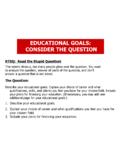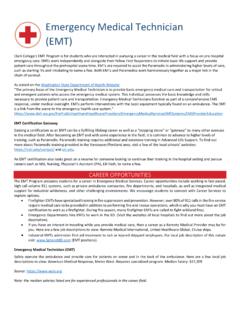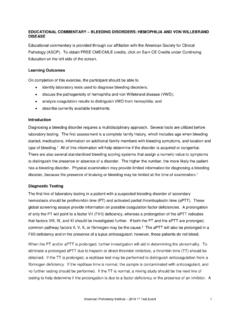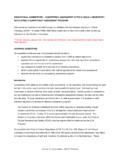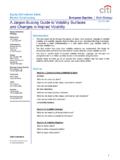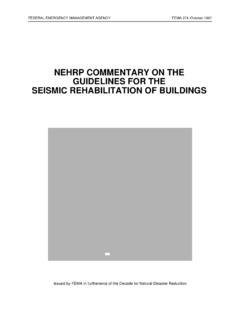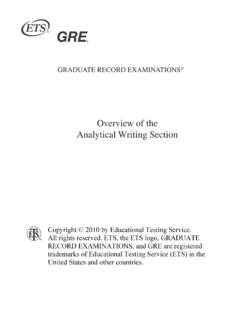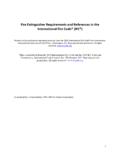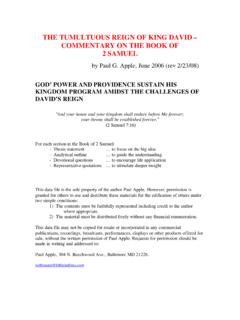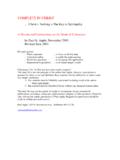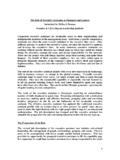Transcription of EDUCATIONAL GOALS: CONSIDER THE QUESTION
1 EDUCATIONAL goals : CONSIDER THE QUESTION RTSQ: Read the Stupid QUESTION ! This seems obvious, but many people gloss over the QUESTION . You want to analyze the QUESTION , answer all parts of the QUESTION , and don t answer a QUESTION that is not asked. The QUESTION : Describe your EDUCATIONAL goals . Explain your choice of career and what qualifications, skills, and talents you feel you have for your chosen field. Include your plans for financing your education. (If necessary, you may add one additional page for your EDUCATIONAL goals .) 1. Describe your EDUCATIONAL goals . 2. Explain your choice of career and what qualifications you feel you have for your chosen field. 3. Include your plans for financing your education. PURPOSE THE QUESTION To give a sense of you as a person. To show that you understand the field you want to enter. To show that you can think reflectively and sympathetically. To show that the degree will build on previous experiences, and not be a discontinuous experience.
2 Questions to Ask Yourself before Writing: What is unique about my background? When did I become interested in this field? What specific experiences (including work experiences) have furthered this interest? What are my career goals ? What personal characteristics, skills, etc. will enhance my prospects for success in this field? DOs and DON Ts DO Organize your response. Look at the QUESTION ; it has a natural organizational pattern a blueprint. DO Ask your friends and family to help you remember all the details from which you can select when you write your essay. It is easy to forget things you have done in the past. DO Fit your essay into the big picture of your application. If you say you have always wanted to be a veterinarian, but have no evidence to show that you have ever been exposed to that career, your words will be suspect. DO Show what you are like as a person, but be as selective as possible. This is not a biography, but a demonstration of the characteristics that prompted your career choice.
3 DO Find a controlling idea for your essay. Smooth prose leaves a good impression. A series of short, curt sentences does not. DO Find a controlling idea for your essay. Smooth prose leaves a good impression. A series of short, curt sentences does not. DO Be positive and upbeat in tone. DO Show that you know something more about the field you have chosen than what you have seen on TV or in movies. DO Take your drafts to the College Writing Center or ask a guidance counselor for help. Does the essay flow? Is the main point clear? Do you sound like a real person (preferably an interesting real person)? Do you have enough detail? Too much detail? DO Revise the essay and proofread. DO Show your final draft to friends. Ask them, Does this sound like me? DON T Just tell a story. You want to explain your career goals in an interesting way, not entertain with descriptive adjectives. DON T Assume names of people and places give enough information. Describe your activities and experiences as they relate to your career goals .
4 DON T Write what you think the scholarship committee wants to hear. The committee members can detect before opening the packet. DON T Use clich s or generalities. This wastes valuable space and time. DON T Brag. Trust that your good points will shine through. THE RIGHT AND WRONG THE GOOD AND BAD THE FUNDED AND UNFUNDED EXAMPLES: EXAMPLE #1 (1) Don t admit this! If you don t have EDUCATIONAL goals , how can you answer the QUESTION ? Stop now and make a solid plan. (2) We are four sentences into the essay, and the reader has no clue about a subject interest. At all costs, avoid vague words like things and someone. If you don t know where to begin, should you be funded while you search for a goal? I don t have specific EDUCATIONAL goals . (1.)Yes, I want to get a degree in my field but that is not the only thing I want to do. My EDUCATIONAL goal is to learn as much as I can from whoever will be giving it to me. I want to do so many things that I don t even know where to begin.
5 (2.) (3) Now we are getting somewhere. This would be a good place to give examples of problem solving skills and determination. Relate this statement to something in past, like a class or community project. (4) While this is a serious consideration, worded this way it undermines determination. I am truly passionate about one thing though and that is math. I enjoy math and how it works into our physical world. I think I would succeed in this field that I have chosen, which is engineering, because when it comes to problem solving I don t easily give up until I come to a solution. (3.) Financing my education is probably my biggest concern. With my parent s being divorced and not speaking to each other I don t want to be a bother to either of them. I would work my way through college if I have to. (4.) Commentary: This student stumbled out of the starting gate by admitting he/she had no goals . There is very little concrete information in this essay. The vague language does not indicate focus, and the wording does not demonstrate determination.
6 There are no examples to support a love of math or problem solving. The last sentence ends the essay with the same ambiguity of the first: if I have to. EXAMPLE #1 - continued EXAMPLE #2 (1)The student has indicated two possible majors, but shows no preference for either. (2) There is no detail here. Some research tells the reader nothing. The student should indicate the type of research he/she is interested in. (3) The student has no four-year school in mind, nor does he/she indicate the type of degree to be earned. My goal is to attend Clark and study biology or chemistry. (1.) One day I want to do some research. (2.) After Clark I will transfer to a four-year school and get a degree. (3.) Commentary: This essay provides no details. The reader has no insight into the individual or his/her dedication to an education. EXAMPLE #3 (1) This is a very short statement of a plan. Plans are not necessarily goals . goals should be long-term (but not so long-term as to be unrealistic).
7 The plan, as stated here, does not constitute a goal. A career in education will require more than an Associates Degree. The student should give long-term, obtainable goals . He/she should, for example, indicate that he/she has investigated four-year programs for education. (2) This is a vague statement. Excellent people skills is a clich . It conveys no meaning without examples. The student needs to demonstrate his/her people skills by giving examples and the student should explain what he/she means by an interest in helping young people. I plan to complete the requirements for the Associates Degree and major in Education. (1.) I have excellent people skills and a deep interest in helping young people. (2.) (3) The final statement on funding is very weak. The student hopes to have his/her education funded by scholarships, grants, or student loans. This wording implies a lack of research and planning. I hope my education will be funded by scholarships, grants or student loans.
8 (3.) Commentary: This student probably has a career goal, but he/she has not articulated it. The overall structure technically addresses all aspects of the QUESTION , but provides no detail or insight. EXAMPLE #3 - continued EXAMPLE #4 (1) The problem here is no detail. The student should indicate how he/she has helped people with emotional problems. Listening to friends does not seem to be a good foundation on which to build a career. (2) The student commits a common error. If the GPA is less than stellar, don t refer to it unless specifically asked. The reader would the purpose of including this statement. Does the student want to imply that with scholarships, rather than a full-time job, he/she could have a better GPA? The point here is confusing. (3) The student ignores the third part of the QUESTION . I plan to become a chemical dependency counselor for two reasons. Number one, I like to help people with emotional problems. I always listen to my friends. Number two, I am good at helping people.
9 (1.) I hope to succeed in this program. My GPA is and I want to improve it. (2.) With your help, I will complete my program. I would appreciate all the financial aid I get. (3.) Commentary: This essay demonstrates common problems, no detail, no plan. EXAMPLE #5 (1) This is a very good statement of EDUCATIONAL goals . The student is currently pursuing phase one of the goal. Phase two of her goal is clearly planned (notice that she has investigated the program at Eastern Washington). The includes a longer termed goal when she states that she hopes to earn a Masters Degree. I am currently enrolled in the Dental Hygiene Program at Clark College and will graduate in the Spring of 2001. After taking a year off from school to work in the field, I plan to begin the degree program through Eastern Washington University (coordinated by the Dental Hygiene Director) and earn a Bachelors Degree in Dental Hygiene. Eventually, I hope to be able to teach at a college level and earn a Masters Degree in dental Hygiene.
10 (1.) (2) This paragraph clearly defines her reasons for becoming a dental hygienist. Her first statement is pragmatic: the field offers the income and flexibility required to raise children. She continues to point out that she is very familiar with the field and that she enjoys the environment of the dentist s office. Her enthusiasm for her career is obvious, and her desire to be a calming presence indicates that she is well suited to dentistry. I have chosen a career in Dental Hygiene because I know it will provide me with the salary I need to support my children as well as the flexibility in hours necessary for a single mother. I have several close friends who are Dentists or Dental Hygienists and they have provided me with a thorough understanding of a career in Dentistry. I enjoy the working atmosphere of a dental office and I am extremely excited about the field. The more I learn in the program, the more passionate I become about dentistry and helping patient s achieve optimum oral health.
